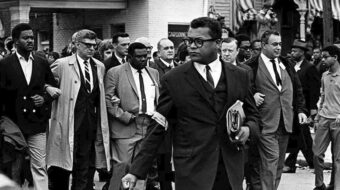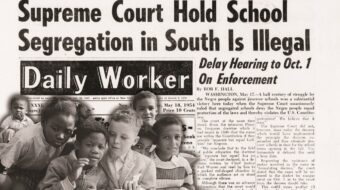
WASHINGTON – The Obama administration’s Justice Department is reluctant to take on the fight against voter suppression efforts nationwide, unless they’re in states and cities, almost all in the South, clearly covered by Voting Rights Act provisions designed to end historic racial discrimination in elections, a prominent attorney and organizer of pro-voting rights campaigns and legal aid says.
The reason, adds Lucas Graves, co-founder and director of the Fair Elections Legal Network, is the agency doesn’t want to appear to be political in voting rights fights – even though all but one of the voter suppression measures was initiated or pushed by the same GOP-business coalition that tramples on workers’ rights.
Governors and legislatures in 30 states – from Maine to South Carolina to Texas to Indiana to Rhode Island to Wisconsin and more – restricted voting rights. A few of their laws have been rolled back. Labor has blasted such suppression. AFL-CIO Executive Vice President Arlene Holt Baker, a civil rights movement veteran, says the laws remind her of “Jim Crow” laws that blocked blacks from voting in her native South.
Among the requirements that suppress voting: People must identify themselves only by specific state-issued – and often expensive – forms of photo identification, and states restricted or repealed early-voting and absentee voting rights. Lawmakers also repealed recent measures that returned the right to vote to former felons who had served their terms. In Florida, their restrictions on voter registration were so onerous that non-partisan, non-political League of Women Voters pulled out of the state.
Other tactics include forbidding election judges from telling voters if they’re at the wrong precinct and denying voters the right to cast ballots only in federal races, even if they’re at the wrong place, Graves said. He left out one notorious tactic that a right-wing Ohio GOP Secretary of State used in 2004: Undersupplying voting machines to Democratic precincts and oversupplying them to Republican ones.
In his Feb. 28 talk to the Women’s National Democratic Club, Graves estimated such measures, if allowed to stand, could remove millions of voters from the rolls before the Nov. 2012 balloting – and they would be workers, the poor, students, the elderly, and minorities. Yet the Justice Department is reluctant to move against the repression.
“They don’t want to look partisan,” he explained. “That view is kind of hard to understand in the context of what’s going on.”
The Justice Department has challenged voter suppression so far only in Southern states whose past history of racial discrimination puts them under the Voting Rights Act’s requirement that any of their laws that could affect voting must pass muster with either the agency’s Civil Rights Division or the federal courts. But there’s another – and unused — Voting Rights Act section, Graves said, that covers every state and allows DOJ to intervene in cases where the apparent effect is suppression of minorities.
In a speech in January to a progressive legal group, Thomas Perez, the assistant attorney general for civil rights, discussed his department’s vigorous campaign against voter suppression statutes in the South. But he did not mention the other states and did not take questions. Questions emailed to his spokeswoman about what the agency was doing about the other states were unanswered. Holt Baker has led the AFL-CIO’s lobbying for the Justice Department to fight voter suppression laws nationwide.
With no help expected from the administration, Graves had some advice – and offered aid – to groups concerned about voter suppression. It was to arm themselves with details of each state’s voting requirements and register voters, doing everything by the book, now. His legal network prepared materials to help groups, including unions, college student groups, and the Leadership Conference on Civil Rights, do so.
“The lack of information” on how to correctly register “has always been a problem,” Graves said.
Photo: Marchers marking the 47th anniversary of the Selma to Montgomery voting rights march led by the Rev. Dr. Martin Luther King Jr. say their march, more than a commemoration, is an extension of the original protest directed against supression of voting rights today. Associated Press Photo












Comments